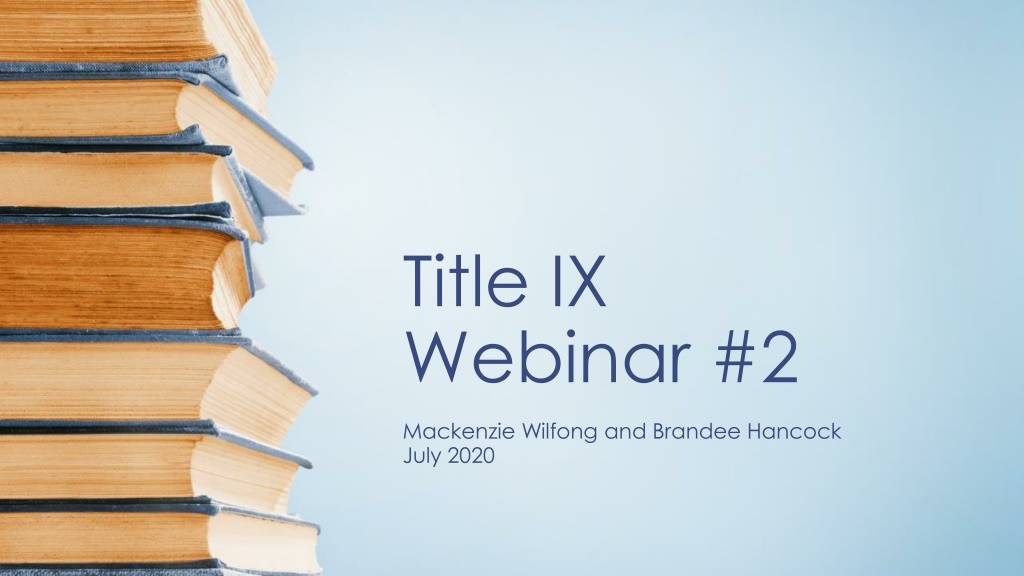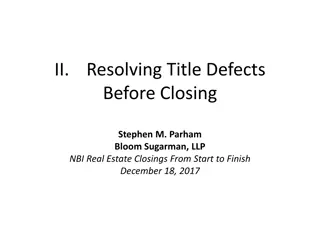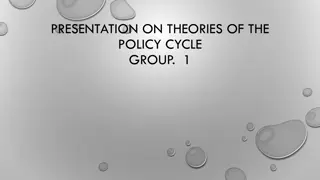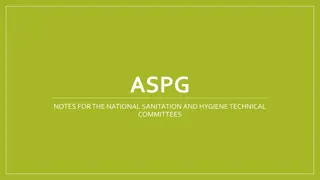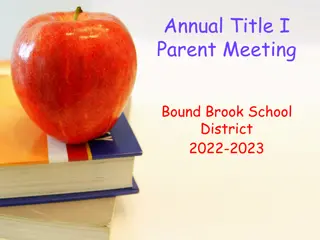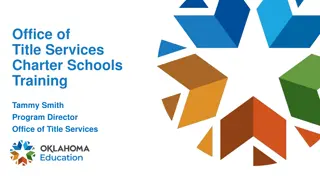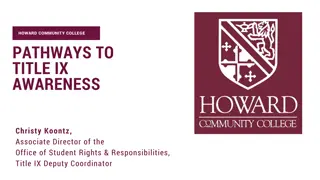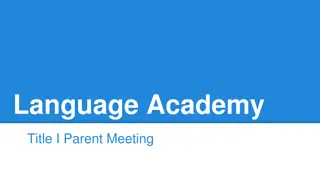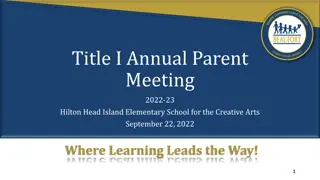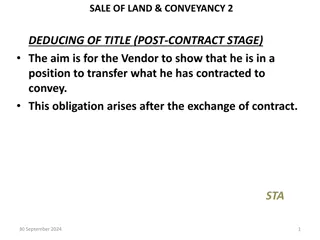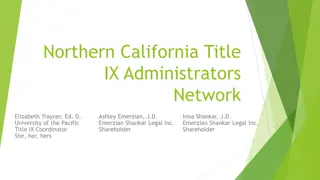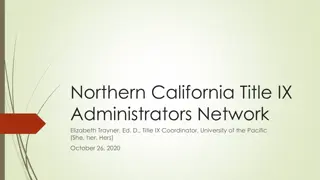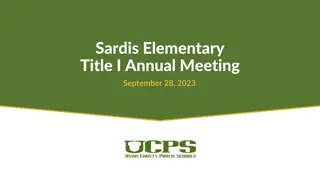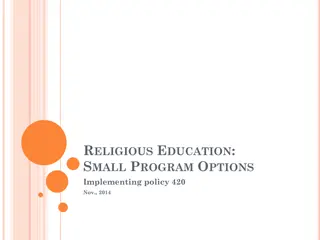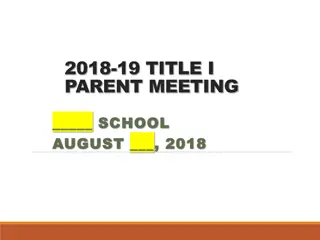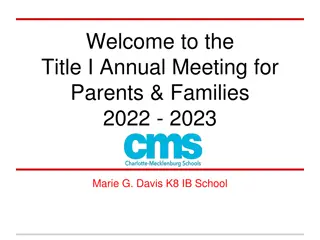Understanding Title IX Policy Options and Considerations
Exploring the decision between having one comprehensive policy or two separate policies for addressing Title IX issues on campus. Discusses the implications, challenges, and factors to consider in the policy-making process to ensure clarity, compliance, and effectiveness in handling cases of sexual harassment and discrimination.
Download Presentation

Please find below an Image/Link to download the presentation.
The content on the website is provided AS IS for your information and personal use only. It may not be sold, licensed, or shared on other websites without obtaining consent from the author. Download presentation by click this link. If you encounter any issues during the download, it is possible that the publisher has removed the file from their server.
E N D
Presentation Transcript
Title IX Webinar #2 Mackenzie Wilfong and Brandee Hancock July 2020
Lets get started Need more information, a good place to start is the SUNY Joint Guidance https://system.suny.edu/sci/tix2020/ We are providing these presentations to you, use them, modify them. We will close caption these four webinars and place them in the Dropbox. 2
How many policies do we need?
An explanation of the quandary Title IX cases have become a short-hand for any campus disciplinary process involving sex discrimination, including those arising from sexual harassment and sexual assault. Under the Final Rule, Colleges and Universities must narrow both the geographic scope of its authority to act under Title IX and the types of sexual harassment that it must subject to its Title IX investigation and adjudication process. Many institutions will decide that onlyincidents falling within the Final Rule s definition of sexual harassment will be investigated and, if appropriate, brought to a live hearing with Cross- Examination through the Title IX Grievance Policy. 4
One policy or Two policy options One Policy - A Code of Conduct that defines certain behavior as a violation of campus policy, including Sexual Harassment, Sexual Assault, Domestic Violence, Dating Violence, Stalking, and related sex-based offenses. Two Policies - A Code of Conduct that defines certain behavior as a violation of campus policy, and a separate Title IX Grievance Policy that addresses the types of sex-based offenses constituting a violation of campus policy via the Final Rules, and the procedures for investigating and adjudicating those sex- based offenses. The Title IX Grievance Policy will become effective on August 14, 2020, and will only apply to formal complaints of sexual harassment brought on or after August 14, 2020. 5
Items to weigh in deciding if one policy or two It will help with the inevitable and iterative rollback we anticipate. What document do you want to keep revising and removing pieces from? These eventual changes are not a reflection of your policy draft rather they will be due to court orders, injunctions, and regulatory changes that you do not control or even influence. Talk about that concern now with your administration, so you don t loose credibility later. It will help clarify how we address employees by not including it all in a Student centered Code of Conduct. Citing a Student Code of Conduct for example in a Faculty Handbook might be a challenge. Some may view one policy as clearer, it is all complex whether it is located in one or two places. What process are you going to choose for your other protected categories of harassment (race, color, religion, national origin, age, veteran s status)? Likely not the Title IX Grievance Policy outlined in these Final Rules. Keep these in a separate Employee Handbook and Code of Conduct Section. Disability likely already has a separate grievance process under Section 504 and ADA 6
May want to include a revocation comment For example, some have suggested an inclusion in the policy similar to the following: Should any portion of the Title IX Final Rule, 85 Fed. Reg. 30026 (May 19, 2020), be stayed or held invalid by a court of law, or should the Title IX Final Rule be withdrawn or modified to not require the elements of this policy, this policy, or the invalidated elements of this policy, will be deemed revoked as of the publication date of the opinion or order and for all reports after that date, as well as any elements of the process that occur after that date if a case is not complete by that date of opinion or order publication. Should the Title IX Grievance Policy be revoked in this manner, any conduct covered under the Title IX Grievance Policy shall be investigated and adjudicated under the existing Code of Conduct or Employee Handbook. 7
Title VII Considerations
Title VII Considerations Recipients are expected to handle any formal complaints of sexual harassment in an education program or activity against a person in the United States through the grievance process in 106.45. The grievance process in 106.45 applies irrespective of whether the complainant or respondent is a student or employee. See 85 Fed. Reg. at 30440 The Department is aware that Title VII imposes different obligations with respect to sexual harassment, including a different definition, and recipients that are subject to both Title VII and Title IX will need to comply with both sets of obligations. See 85 Fed. Reg. at 30440. Remember the ands and or are different between Title IX and Title VII definitions. 9
Moving from one policy/process to another If a recipient has a code of conduct for employees that goes beyond what Title IX requires (for instance, by prohibiting misconduct that does not meet the definition of sexual harassment under 106.30, or by prohibiting misconduct that occurred outside the United States), then a [College] may enforce its code of conduct [think employee handbook] even if the recipient must dismiss a formal complaint for Title IX purposes. These regulations do not preclude a recipient from enforcing a code of conduct that is separate and apart from what Title IX requires, such as a code of conduct [employee handbook] that may address what Title VII requires. See 85 Fed. Reg. at 30440 10
How do you do this practically? You have a waterfall process. You analyze under the Title IX Grievance Policy consistent with the Final Rule definitions (which is why it should be stand alone) For student respondents if you dismiss or it does not fit you waterfall it to the Student Conduct Process. For Employee respondents if you dismiss or it does not fit you waterfall it to the appropriate Handbook (employee, staff, or faculty handbook whatever you all call it at your institution). Consider how you notify when it falls to a secondary handbook process. You could easily notify in the dismissal notification letter. 11
Concurrent Enrollment
Which policies prevails? A K-12 school may adopt a policy that requires live hearings all the time, not at all, on a case-by-case basis, or under circumstances that are defined by age or academic year of the parties. 85 Fed. Reg. at 30365 Several comments to the regulations requested that the DOE specifically address students who are dual-enrolled in high school and college, the DOE refused stating that the more exceptions that would be made, the less likely it would be for students and employees to know what to expect from an institution. The DOE specifically maintains that individuals developmentally capable enough to enroll in college are also capable enough to make decisions about and participate in a grievance process designed to advance the person s rights. See 85 Fed. Reg. at 30335. 13
Which policies prevails? Both a K-12 school and a college would be considered institutions that must respond to complaints of sex discrimination by a student who is dually enrolled in a college program through the K-12 school. You need to amend your concurrent agreements, or enter into a separate agreement with the schools, to address which Title IX policy will apply. Without an MOU regarding which institution responds to what types of scenarios and delineating information sharing expectations, both recipients risk liability exposure for failing to mount an appropriate response to complaints. More information see https://system.suny.edu/media/suny/content- assets/documents/sci/tix2020/Directed-Question-2.pdf 14
Policy versus Process
Policy/Process In developing policy, consider whether certain components would better fit in a separate process document Investigative process required timelines may need to be in policy, but details of how an investigation is conducted may better fit in a process manual/document Hearing process some details will need to be included in policy, but specific of how a hearing operates, an advisor s role, etc. may better fit in a process document that can be provided to parties Allows flexibility in the event adjustments are needed to process without changing an institutional policy 16
Evidentiary Standard
What are the options? Standard of evidence reflects the degree of confidence that a decision-maker has in correctness of the factual conclusions reached. 85 Fed. Reg. 30384 106.45(b)(1) must state whether the standard of evidence is preponderance of the evidence or clear and convincing Must apply the same standard to all Formal Complaints against both students and employees Neither standard is defined (see Definitions provided with Webinar 1) Consider carve-outs to policies that currently provide a different standard of evidence (i.e. faculty handbook) 18
Mandatory Reporters (Responsible Employees)
Mandatory Reporters Actual knowledge occurs only when notice of the alleged sexual harassment is received by the Title IX Coordinator or any official of the recipient who has the authority to institute corrective measures on behalf of the recipient. 106.30 (emphasis added) Sets the floor, not the ceiling. Institution is free to designate additional mandatory reporters. Regulations allow any person to report, but only Complainant (or Title IX Coordinator in limited cases) can initiate Formal Complaint Consider Title VII implications (should supervisors be included)? Consider intersection with Campus Security Authorities under Clery Act 20
Supportive Measures (previously referred to as Interim Measures)
Supportive measures basics Final Rule 106.30 defines supportive measures as non-disciplinary, non-punitive individual services offered to the complainant or respondent. The Rule does not say that such services need to be provided to witnesses. A recipient may choose to continue providing supportive measures to a complainant or a respondent after a determination of non- responsibility. 85 Fed. Reg. 30183. They can last a long time, which is likely why they dropped the term interim measures. The Title IX Coordinator is responsible for offering ( 106.44(a)), and coordinating the implementation of ( 106.30), supportive measures. A school can designate more than one employee as a Title IX Coordinator if necessary in order to fulfill this and other required responsibilities. 85 Fed. Reg. 30183. 22
Confidentiality of supportive measures 106.30(a) requires that supportive measure services that are provided to either the complainant or the respondent be kept confidential unless disclosure is necessary to provide the service. Of course, no contact orders require the other party to be aware. 23
What is/ is not considered a supportive measure? These services must be offered as appropriate, as reasonably available, and without fee or charge. The Rule lists services such as counseling, extensions of deadlines or other course-related adjustments, modifications of work or class schedules, campus escort services, mutual restrictions on contact between the parties, changes in work or housing locations, leaves of absence, increased security and monitoring of certain areas of the campus, and other similar measures Emergency removal (formerly known as an Interim suspension) or expulsion of a respondent is not included in the list of supportive measures. 24
Common issue - Housing The Department defined housing changes as non-disciplinary and were included in the list of supportive measures. If the complainant and the respondent live in the same dorm and the complainant wants that to change, who moves? OCR guidance from 2017 warned against automatically moving the respondent: [i]n fairly assessing the need for a party to receive interim measures, a school may not rely on fixed rules or operating assumptions that favor one party over another . Question 3, September 2017 Q&A on Campus Sexual Misconduct. The Department declines to include an explicit statement that schedule and housing adjustments, or removals from sports teams or extracurricular activities, do not unreasonably burden the respondent as long as the respondent is not separated from the respondent s academic pursuits, because determinations about whether an action unreasonably burdens a party are fact-specific. 85 Fed. Reg. 30026, 30182 (May 19, 2020). It appears that a school can t automatically move the respondent or the complainant, but ... must take into account the nature of the educational programs, activities, opportunities, and benefits in which the party is participating, not solely those educational programs that are academic in nature. Whoever is in charge of supportive measures will need to analyze each measure including changes in housing to make sure is does not unreasonably burden either party. 25
Common Issue No Contact Orders While the regulations specifically include mutual orders, the Preamble notes that one-way orders may be appropriate if based on a fact-specific inquiry. Examples given for one-way orders include helping to enforce a restraining order, preliminary injunction, or other order of protection issued by a court. 26
Refusing to provide a supportive measure [I]f a recipient determines that a particular supportive measure was not appropriate even though requested by a complainant, the recipient must document why the recipient s response to the complainant was not deliberately indifferent. 85 Fed. Reg. 30181 n. 801. If you refuse a complainant a supportive measure you need to document and keep on file the reasons why such a denial was not clearly unreasonable in light of the known circumstances. Interestingly, there is no similar recordkeeping requirement regarding the reasons for not providing supportive measures to a respondent. 27
Who can be an advisor and what is their role? Anyone can be an advisor. May, but need not be, an attorney. 106.45(b)(3)(iv) Advisor must be allowed to participant in any meeting or grievance proceeding. 106.45(b)(3)(iv) Advisors must be allowed to question the other party (conduct cross-examination) and witnesses. 106.45(b)(6)(i) Institution required to provide an advisor free of charge if a party does not provide one. 106.45(b)(6)(i) Advisors must be either professionals (e.g. attorneys or experienced advocates) or at least adults capable of understanding the purpose and scope of cross-examination. 85 Fed. Reg. 30329 If a party arrives for a hearing without an advisor, must stop the hearing to assign an advisor to conduct cross-examination. 85 Fed. Reg. 30342 If a party refuses to work with an advisor, cannot conduct cross-examination 29
Limits on Advisors Institution can set limits on the advisor s participation, so long as the limits apply equally to both parties. 106.45(b)(3)(iv) Up to institution to decide if advisors may conduct direct examination of party (as opposed to cross-examination, which is required) Can establish rules of decorum for advisors to ensure that parties and advisors, including assigned advisors, conduct cross-examination questioning in a respectful and non-abusive manner. 85 Fed. Reg. 30340 Permissible limitations include: requiring a party to personally answer questions during an interview or to personally make opening/closing statement during hearing. 85 Fed. Reg. 30298 Consider a Guide for Advisors or similar document 30
Institutionally Provided Advisors Consider a pool of advisors that are trained Internal or external to institution? Explain importance of remaining within role Make clear to all parties that advisor does not mean providing advice, explaining process, or anything outside of the very specific role of the advisor 31
A few initial thoughts about a second look A student who is removed may Challenge a emergency removal (previously called an interim suspension) No rules or required bases, other than the opportunity must be immediate . A non-student employee s administrative leave does not have to be appealable unless you have a policy that allows an appeal 106.44(d) does not define the permissible terms and conditions of the administrative leave (i.e., whether with or without pay and benefits). The administrative leave is designed to effectuate a temporary separation of the non-student employee, while the grievance process ensues under its reasonably prompt time frame. Both parties can appeal a dismissal of a complaint (both the required and permissive dismissal) and a determination regarding responsibility (responsible or not responsible). 33
NPRM vs. Final Rule The Final Rule makes a significant change from the Notice of Proposed Rulemaking (NPRM) with respect to requiring appeals: the NPRM did not require institutions provide for appeals at any stage of a Title IX sexual harassment grievance process. The final rule requires both parties must be able to appeal a dismissal (both the required and permissive dismissal) and a determination regarding responsibility (responsible or not responsible) 34
Three mandatory bases for appeals Same three bases for dismissals and determination regarding responsibility. Must provide both parties the ability to appeal for alleged: 1. Procedural irregularity that affected the outcome of the matter; 2. New evidence that was not reasonably available at the time the determination regarding responsibility or dismissal was made, that could affect the outcome of the matter; and 3. The Title IX Coordinator, investigator(s), or decision-maker(s) had a conflict of interest or bias for or against complainants or respondents generally or the individual complainant or respondent that affected the outcome of the matter. 35
Appeal basis #1 What is a procedural irregularity? The phrase procedural irregularity is not defined in the Final Rule or preamble, but generally can be considered a failure to follow an institution s own procedures. The preamble suggests that procedural irregularity could include failure to objectively evaluate all relevant evidence, including inculpatory and exculpatory evidence, during the investigative process. 85 Fed. Reg. at 30249. Parties may appeal any erroneous relevance determination if it affected the outcome. Id. at 30343. Remember is has to be material and affected the outcome. Ask the party who is appealing how they perceive that the procedural irregularity affected the outcome, this should be a part of the appeal form. 36
Appeal basis #1 What is newly discovered evidence? The Final Rule and preamble suggest a two-step process for evaluating if newly discovered evidence warrants the granting of an appeal. Step 1: Is the evidence proffered by an appealing party indeed new? Step 2: If the evidence was not provided at any time prior to the determination of responsibility, the key question on appeal will be to evaluate whether the new evidence could have affected the outcome. Again ask the appealing party how this could have affected the outcome. 37
Appeal basis #3 When does one have a Conflict of interest or Bias? In defining what constitutes a conflict of interest or bias, the Final Rule simply indicates that Title IX Coordinators, investigators, decision-makers, and/or informal resolution facilitators must not be biased against a particular class of parties in the grievance process. They must not harbor biases against complainants or against respondents. As such, an individual s status as a respondent must not be considered a negative factor during consideration of the grievance. The Department encourages the adoption of objective standards for determining potential biases and/or conflicts of interest. An objective standard, according to the Department is whether a reasonable person would believe bias exists. 85 Fed. Reg. at 30252. What is not bias? The Department declined to deem a recipient s employees as per se biased for purposes of the Title IX grievance process. The Department stated that a recipient s employees may serve in the roles of Title IX Coordinator, investigator, and/or decision-maker, and could fulfill those responsibilities without bias. 85 Fed. Reg. at 30250 The Department stated that it would not consider past advocacy activity as per se grounds for excluding an individual from serving a role in the grievance process, 85 Fed. Reg. at 30251-20252. The Department indicated that no per se rule prohibits the Title IX Coordinator from serving as the Title IX investigator. 85 Fed. Reg. at 30252 fn. 1035. 38
Interesting appeal considerations A respondent might appeal a determination that the alleged conduct did not constitute sexual harassment as defined in 106.30. Underlying such an appeal would be the respondent s ability to have the enhanced procedural rights and protections mandated under 106.45 for Title IX proceedings, rather than potentially less comprehensive protections defined in an institution s process for a non-Title IX code of conduct violation like a Student Code of Conduct that does not include cross- examination. See 85 Fed. Reg. at 30288 fn 1129. 39
Appeal Procedures When one party appeals, the other party must be notified in writing. The appeal decision-maker(s) must be different from anyone who made the determination regarding responsibility or dismissal and must not be either the investigator or the Title IX Coordinator. The decision-maker(s) must be free from conflict of interest and bias, receive appropriate training (including anti-bias training), and otherwise comply with the requirements set forth in Final Rule 106.45(b)(3)(iii). Both parties must be given a reasonable, equal opportunity to submit a written statement in support of, or challenging, the responsibility determination or dismissal. The outcome of the appeal must be in writing, and must include the rationale. The written decision must be provided simultaneously to both parties. The preamble and regulation are silent about the proper remedy for an appeal, even if one of the mandatory grounds is found to have been present by the appellate decision-maker. Institutions should consider what remedies may be implemented and by whom, and specify these items as part of their policies and procedures. Uphold, overturn, remand for a new hearing, remand for consideration without a new hearing. 40
Confidentiality Explain in policy if institution has confidential reporting options Make sure consistent with Clery Act Supportive measures should keep Complainant s identity confidential unless disclosing the Complainant s identity is necessary to provide supportive measures. 85 Fed. Reg. 30133 Institution should not under the guise of confidentiality concern, impose prior restraints on students and employees ability to discuss the allegations under investigation, for example with a parent, friend, or other source of emotional support, or with an advocacy organization. 85 Fed. Reg. 30295 If using information resolutions, may keep them confidential. FERPA prohibits disclosure to third parties of personally-identifiable information related to students. If conflict between FERPA and Title IX, Title IX Regulations prevail. 85 Fed. Reg. 30424 42
Amnesty Considerations Amnesty clauses in Title IX policies reduce barriers to reporting, encouraging victims and witnesses to come forward with any knowledge or experience of an incident of sexual assault. The final regulations do not require amnesty provisions under which institutions promise students who come forward with sexual harassment allegations that they will not be charged with other violations, they also make clear that where other such charges are brought with the purpose of interfering with or deterring students from bringing complaints under Title IX, they constitute prohibited retaliation. If you choose to not include an amnesty policy be aware of potential retaliation implications. 44
Amnesty Considerations Potential policy language could include: In order to encourage students to make reports of conduct prohibited under this policy, the College/University will not pursue disciplinary action against students for disclosure of personal consumption of alcohol or other drugs (underage or illegal) where the disclosure is made in connection with a good faith report or investigation of prohibited conduct and the personal consumption did not place the health or safety of any other person at risk. The College/University may initiate an assessment or educational discussion or pursue other non-disciplinary options regarding alcohol or other drug use. Texas and NY have state laws regarding mandated amnesty policies https://www.knowyourix.org/statepolicy-playbook/safe-confidential- reporting/ 45
